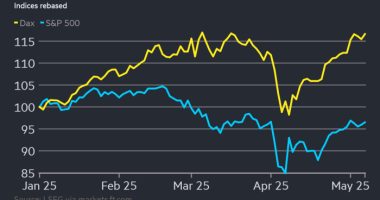Share this @internewscast.com
Opinions expressed by Entrepreneur contributors are their own.
If there’s one thing economists are sure about this year, it’s that interest rates are coming down. Even the Federal Reserve’s officials have been upfront about their plans to lower short-term rates by at least three-quarters of a percentage point. Financing and credit will be easier to come by, but how can you take advantage? As the chief economist at Instawork, here are some of my tips to prepare:
Distinguish between short-term and long-term rates. Short-term interest rates have been coming down in anticipation of the Fed’s moves, but long-term rates actually started to increase at the end of 2023. With the Treasury borrowing more and more to finance the federal government’s debts, there’s a lot of demand for long-term credit. Moreover, the Fed has been selling off its own long-term assets, which drains the supply of money from that side of the market.
These moves have direct repercussions for businesses since long-term rates are the ones that determine the cost of borrowing for capital expenditures. So if you’re planning to seek funding for a new factory, an overhaul of your offices or expansion into a new market, keep your eye on the rates that correspond to the time after which you’ll repay.
Pick the right moment to raise money. If you’ve been thinking about an initial public offering (IPO) or tapping another source of funding, two things will affect the optimal timing: the growth of your business and the competing options for returns. The best moment usually arrives when growth is high and other possible investments are paying low rates.
The economy has been growing fairly rapidly, and expectations are for continued moderate growth this year. But it may take a couple of years for interest rates to fall to the “easy money” levels from before the Covid-19 pandemic, if they do at all. What will happen after the elections in November is anyone’s guess, but companies considering an IPO may well be rewarded for waiting.
Refinance debt when possible. Just as homeowners flock to refinance their mortgages when rates drop, so should businesses seek out lower rates for their outstanding debts. As the supply of credit grows, lenders are typically more willing to consider refinancing.
The key is to calculate the true value of a refinancing deal — not just after paying fees, but also when considering the difference between the refinancing rate and the interest rates in the market. A lender might offer a no-fee refinancing, but it’s not necessarily a bargain if the rate is higher than what other lenders would agree. The same goes for refinancing deals that “reset the clock” for a loan, implying a longer series of repayments in the future.
Be aware of fluctuating exchange rates. Big institutional investors move markets, and today’s institutional investors like to take advantage of international differences in interest rates. If they can borrow at 4% in Europe and earn 5% in the United States, even for a short time, they will. But if rates fall more quickly in the United States than in Europe, some of that money could go in the opposite direction, weakening the dollar along the way.
If you’re negotiating contracts with international suppliers or if you’re selling into markets abroad, then these exchange rates have a direct effect on your bottom line. In fact, given the volatility that could result in foreign exchange markets this year, you might want to consider long-term deals that lock in rates for several months or more.
Use caution when hiring. The labor market is still tight by historical standards, and the economy is growing fairly quickly. If anything, economists are concerned that the Fed won’t lower rates fast enough to stave off higher unemployment. Yet with lower inventories in retail and an uptick in some manufacturing industries, as well as sustained demand for services, things could also heat up again. After all, the unemployment rate was even lower than it is now for long spells in the past couple of years.
This atmosphere of uncertainty means businesses ought to be careful in the labor market. Hiring — and sometimes firing as well — carries a fixed cost that can’t be recouped. As an alternative, employers may want to consider using flexible workers, either on a recurring basis or even on long-term contracts. When the uncertainty clears and demand is steady, these workers will also be great candidates for permanent hires.
As a final note, consider your customers and suppliers. For small businesses that run on cash from day to day, interest rates may not seem too important. But they affect your customers’ ability to buy your goods and services. They also determine how much rent your landlord needs to charge and where your insurance premium might go next. Once you know how these things are connected, you’ll be in a better position to prepare for the trends to come.












